Bronze Age Cyprus
Q2333703Cyprus (Greek Κύπρος): large island in the eastern Mediterranean, colonized by Phoenicians and Greeks.
Prehistoric Cyprus
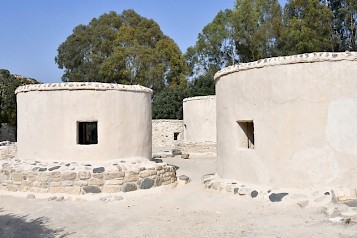
The oldest human remains on Cyprus date back to the Pre-Ceramic Neolithic, about 7000-6800 BCE. Excavated sites like Choirokoitia show that these first settlers must have been farmers living on a diet of wheat. From excavated bones, we can deduce that they had also domesticated goats, pigs, and sheep. Hunting and fishing were also important.
Pottery was introduced at the beginning of the fifth millennium (found at Troulli). The presence of obsidian proves interregional trade with the Aegean Sea. Already at this early stage in its history, Cyprus was an important node in a network connecting the Levant, Anatolia, and the Aegean world.
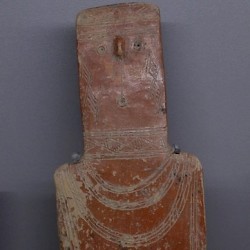 Lapethos, Plank-faced figurine (Early Bronze Age III) |
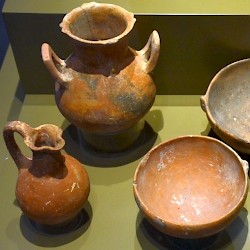 Nicosia, Red-polished Pottery (Early/Middle Bronze Age) |
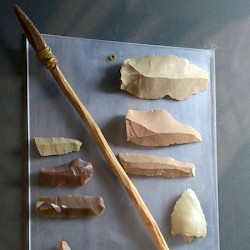 Cyprus, Neolithic flint tools |
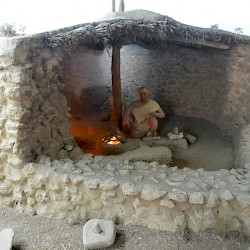 Vrysi, Reconstructed Neolithic hut |
Bronze
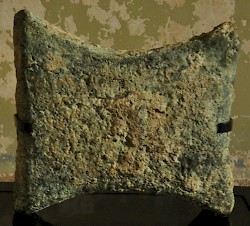
Towards the end of the fourth millennium, the early Cypriots started the exploitation of the copper deposits in the Troodos Mountains in the western part of the island, where several mines have been identified. (In fact, the island's name is derived from this metal.) By now, Cypriote objects often show many similarities to objects from southern Anatolia, which suggests close contacts and almost certainly migration.
Just after the mid-third millennium, the people of Cyprus had learned to make bronze by adding a bit of tin to the copper. The new metal was harder and could be used to make tools, weapons, and other objects. Because Cyprus was one of the most important producers of copper, Egypt and the other states of the Levant could not afford to ignore the Cypriotes, who in exchange for their copper received horses, cattle, gold, and ivory. Rich tombs are evidence for prosperity and the rise of a more stratified society.
Alashiya
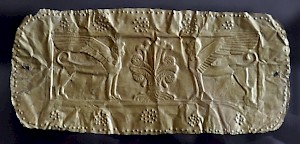
In the second millennium BCE, two ports became very important: Kition in the southeast and Enkomi in the east. The last-mentioned city may have been the capital of a kingdom named Alashiya, although Alassa (north of modern Limassol) is another plausible candidate. It is unclear whether Alashiya covered the whole of Cyprus or was just one of several kingdoms. Several letters found in Amarna, the fourteenth-century capital of Egypt, were sent by the Alashiyan court and discuss the exchange of copper, silver, and ivory.
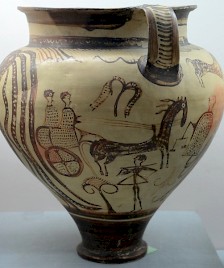
From the sixteenth century on, the Cypriotes employed a script, known as "Cypro-Minoan-1" and resembling Linear-A from Crete, to write the original language of Cyprus, which is known as "Eteocypriot" ("original Cypriot"). Because contacts between Cyprus and Crete were originally not very intensive, it is unclear whether there is any influence, and decipherment of both scripts has so far remained impossible. There are two related scripts, Cypro-Minoan-2 (only found in Enkomi) and -3 (found in Ugarit).The introduction of writing marks the beginning of the Late Bronze Age.
In the following age - let's say from 1400 until 1150 BCE - trade with Minoan Crete and Mycenaean Greece increased. The thirteenth century witnessed the greatest prosperity. Alasiya is mentioned in sources written in Hittite, Ugarite, Egyptian, Akkadian, and Mycenaean Greek, which proves the importance of this kingdom as an interregional trade center.
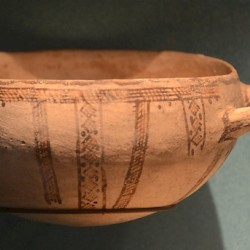 Cyprus, Late Bronze pottery |
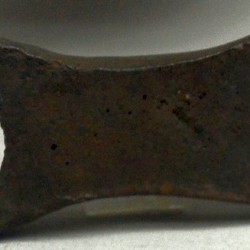 Enkomi, Miniature bronze ingot |
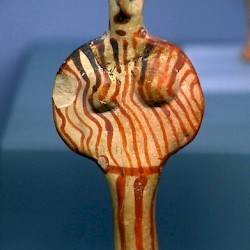 Kition, Mycenaean "phi" figurine |
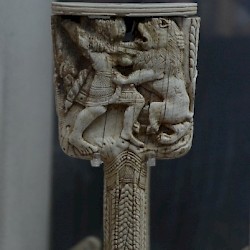 Old Paphos, Evreti, Tomb 8, mirror handle with a lion hunt |
Crisis
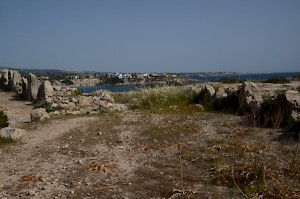
Shortly after 1200 BCE, however, the eastern Mediterranean world was shattered by large-scale destruction, a crisis that is commonly associated with groups of marauders who are known as the "Sea Peoples". The Hittite and Mycenaean civilizations collapsed; in Egypt, the Third Intermediary Period started; the Aramaeans become the dominant nation in the Levant; Enkomi and Kition were looted.
In this confused age, several groups of Greek immigrants settled on Cyprus, for example in Maa (Palaiokastro). The Greek dialects that were later, in the Archaic and Classical ages, spoken on Cyprus prove that these settlers had arrived from the Peloponnese. Later Greek myths about heroes from the Trojan War settling on Cyprus probably contain echoes of these events.note
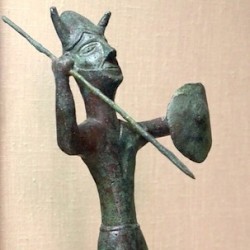 Enkomi, Temple of the Ingot God, Statuette of the Ingot God |
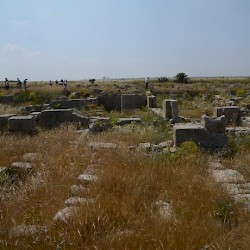 Enkomi, Temple of the Ingot God |
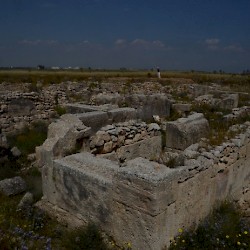 Enkomi, Building 18 |
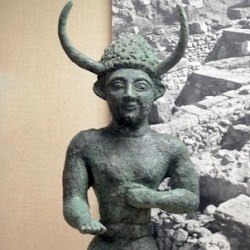 Enkomi, Ashlar Building, Horned god |